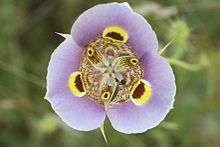Calochortus superbus
| Calochortus superbus | |
|---|---|
 | |
| Scientific classification | |
| Kingdom: | Plantae |
| (unranked): | Angiosperms |
| (unranked): | Monocots |
| Order: | Liliales |
| Family: | Liliaceae |
| Genus: | Calochortus |
| Species: | C. superbus |
| Binomial name | |
| Calochortus superbus Purdy ex J.T.Howell | |
| Synonyms[1] | |
| |
Calochortus superbus is a North American species of flowering plants in the lily family known by the common name superb mariposa lily. It is endemic to California, a common member of the flora in several types of habitat across much of the state. It is most abundant in the Coast Ranges and in the Foothills of the Sierra Nevada.[2][3]
Calochortus superbus is a perennial herb growing up to 40 to 60 centimeters tall with a basal leaf up to 30 centimeters long which withers by flowering. The inflorescence is a loose cluster of 1 to 3 erect, bell-shaped flowers. Each flower has three sepals and three petals all up to 4 centimeters long and blotched with yellow at the bases. There is generally a darker spot within the yellow area, and the base color of the segments may be white to light purple or solid yellow. The fruit is an angled capsule 5 or 6 centimeters long. This plant resembles Calochortus venustus, a chief discriminant being the oval to crescent shaped nectary of C. luteus compared to the squarish nectary of C. superbus.[4][5]
References
- ↑ Kew World Checklist of Selected Plant Families
- ↑ Purdy, Carlton Elmer ex Howell, John Thomas 1932. Leaflets of Western Botany 1(2): 11–13
- ↑ Calflora taxon report, University of California @ Berkeley, Calochortus superbus J. Howell yellow mariposa
- ↑ Flora of North America, Calochortus superba
- ↑ C. Michael Hogan. 2009. Gold Nuggets: Calochortus luteus, GlobalTwitcher.com, ed. N. Stromberg
External links
- Jepson Manual. 1993. Calochortus superba
- United States Department of Agriculture Plants Profile
- Calphotos Photo gallery, University of California @ Berkeley
![]() Media related to Calochortus superbus at Wikimedia Commons
Media related to Calochortus superbus at Wikimedia Commons